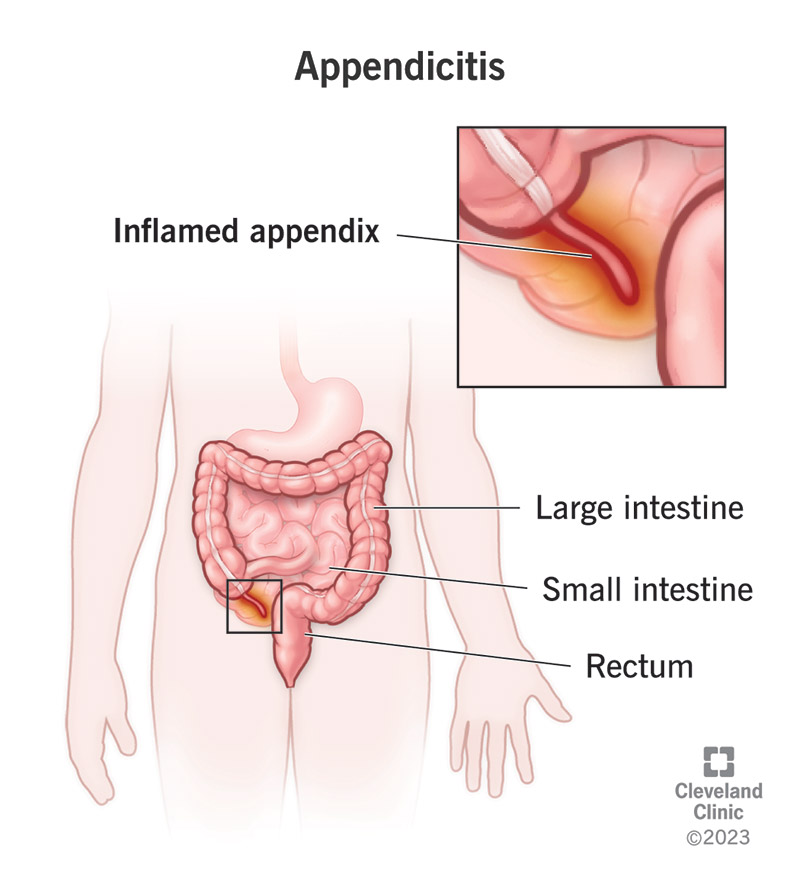- Get link
- X
- Other Apps
JUST IN
- Get link
- X
- Other Apps

Appendicitis occurs when your appendix gets clogged, infected and inflamed. Your appendix is a small, tube-shaped organ attached to your large intestine. Nobody knows what its purpose is — but we do know that appendicitis is serious. The standard treatment is surgery to remove your appendix.
What is appendicitis?
Appendicitis is an inflamed appendix. It can cause acute (sudden, intense) pain in your lower abdomen. Your appendix is a small, tubular pouch, about the size of a finger, that protrudes from the lower right end of your large intestine. Poop (feces) moving through your large intestine can block or infect your appendix, leading to inflammation. Inflammation causes your appendix to swell, and when it swells, it can burst.
A burst appendix is a medical emergency. It spreads bacteria from inside your bowels throughout your abdominal cavity. This infection (peritonitis) can then spread to your bloodstream, which can lead to life-threatening complications (sepsis). Because of this risk, the standard treatment for appendicitis is to remove your appendix (appendectomy). Your appendix isn’t an essential organ, and you won’t miss it.
What are the symptoms of appendicitis?
The most common symptoms of appendicitis are abdominal pain, nausea and loss of appetite. There’s a typical way these symptoms may present that can make it easier to recognize appendicitis. But unfortunately, only about half of people with appendicitis have the classic presentation of symptoms. Kids, elderly adults and pregnant people may be less likely to present with typical symptoms.
What are the early signs of appendicitis?
In the typical presentation, abdominal pain begins in the middle of your abdomen, around your belly button. It may hover or may come and go for several hours. Eventually, the pain intensifies, and nausea and vomiting develop. Several hours later, the nausea passes, and the pain shifts to your lower right abdomen, where your appendix is. The pain becomes more focused and continues to worsen.
What are other possible symptoms of appendicitis?
Additional symptoms may develop later in some people. These can include:
- Fever. Up to 40% of people develop a fever. This means your immune system is kicking into a higher gear. It may also mean inflammation is increasing or it may mean infection is spreading.
- Malaise. You may just notice that you feel generally unwell. You may lack energy or motivation and feel like staying in bed, the way you do when you’re sick.
- Swollen belly. Your abdomen may look distended or feel bloated. This is usually an advanced symptom and may indicate your appendix has ruptured.
- Malaise. You may just notice that you feel generally unwell. You may lack energy or motivation and feel like staying in bed, the way you do when you’re sick.
- Swollen belly. Your abdomen may look distended or feel bloated. This is usually an advanced symptom and may indicate your appendix has ruptured.
Can food cause appendicitis?
There have been rare reports of an undigested seed or nut getting stuck in the opening to the appendix and causing inflammation. In general, though, eating more fiber reduces your risk of appendicitis.
Can appendicitis go away on its own?
It’s possible but not likely. Appendicitis may spontaneously resolve if the cause suddenly goes away on its own. This might happen if an obstruction in your appendix gets unstuck and passes on through your intestine, or if an infection that was causing lymphoid hyperplasia in your appendix suddenly improves. But you shouldn’t assume this will happen or that it has happened, even if your pain has reduced.
Medication
Almost everyone will need antibiotics for appendicitis. Even if you didn’t have an infection to start with, appendicitis usually leads to one. Antibiotics are also a standard preventive treatment before surgery.
If you have a very early and mild case of appendicitis, your healthcare provider might take a wait-and-watch approach to see if your condition improves with antibiotics alone. You might prefer this approach if you have risk factors that make surgery less safe for you.

Comments
Post a Comment
Let know your comments